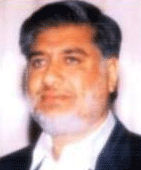

Let’s begin with a note from you on Pakistan’s present day textile industry and your Groups niche in it-
Pakistan is the world’s fourth largest producer and third biggest consumer of cotton. Contribution of Pakistani textile products in total export proceeds of the country is 60% and catering 40% industrial employment of the country. Our Group’s share in the Province of Khyber Pakhtoon Khawah textile sector is 12% and in total spinning sector of Pakistan is 0.50%. We are producing all types of fibers including cotton fiber, manmade fiber and fancy fiber.
Can we request you to draw a word picture on MMF yarn industry in global terms?
Manmade fiber industry is flourishing due to shortage of cotton across the world. Cotton is short mainly due to decrease in cultivation area by almost 6.60% and decrease in yield by almost 4%. Both factors have resulted in decrease of cotton production by almost 11%. This decrease prompted the use of man made fiber.
How is natural fibres segment flourishing in Pakistan? What are current trends in consumers’ preferences?
During last decade 24% growth in spindles and 5.50% growth in rotors is registered in Pakistan spinning industry. Pakistan’s share in world trade also registered increase from 26% to 33% during last decade for cotton yarn. Productivity of spinning machinery is also enhanced and 57% increase is registered in total production of yarn during last decade. Domestic consumers’ preferences are apparent from the fact that they forced the Government to impose Regulatory Duty on export of yarn.
Cotton exports sector, especially in India, is going through times of turmoil due to frequent changes in policies. Has Pakistan’s textile industry been benefited or affected by these movements?
Due to frequent changes in policies in India, for the first time India have a larger share of China’s imports than the US. Tight US supplies are in contrast to abundant Indian supplies. World prices are now substantially above the Indian support price and its cotton is now moving freely in the world market. India’s higher support price induced more domestic production, further increasing exportable supplies. Under the scenario, Pakistan cotton sector also benefited due to higher international prices and registered tremendous increase in export.
Recently, 15 percent export duty on yarn exports is declared by the Cabinet Committee of Textile. How would you voice your concern on this?
The imposition of 15% Regulatory Duty on export of yarn is very harmful for Pakistan cotton and spinning sector. We went uncompetitive in yarn export. We are already having almost 25% surplus production of yarn for our domestic consumption and we have to curtail our production of yarn to the extent of 25%. This will create unemployment and blocked up investment.
Energy Management System (EnMs) is a buzz in Pakistan these days. Which all are the efforts by your Group in line to such Green-footprints norms?
Our group has already implemented energy management system. We have our in-house power generation facilities with the investment of PKR 200 million (US $ 2.4 million).
#######
DISCLAIMER: All views and opinions expressed in this column are solely of the interviewee, and they do not reflect in any way the opinion of Fibre2Fashion.com.